Healthy Lifestyle Articles
Sea Kelp The Nutritional Ocean Herb!

The sea kelp is essentially seaweed that flourishes on sunlight while absorbing the multitude of nutrients and minerals from its underwater environment. In fact sea kelp has an impressive nutrient profile consisting of between ten and twenty times greater than that of our more familiar land vegetables. Not only does sea kelp feed on these important nutrients, minerals, and trace elements from the ocean, it also has this unique ability to concentrate these vital elements within its stems and leaves to almost the exact ratios found in healthy normal human blood. This unique ability is responsible for sea kelp now emerging as a major source for vital elements now absent from our diet.
With the current over farming of our land, foods produced from our nutrient deficient soils are progressively lacking in the vital nutrients, minerals, and trace elements required for good health. In addition, chemical insecticides, herbicides, and pollution are also provoking unhealthy additives. Sea kelp presents a more inclusive nutritional option as it absorbs its payload of nutritional value directly from the ocean without the unwanted unhealthy additives if harvested from unpolluted waters. The ocean contains an abundance of all the nutrients required for the proper healthy functioning of the human body. However, the ocean's supply of minerals is in a rudimentary inorganic state, meaning they cannot be assimilated by the human body until they are first integrated in another organic life form such as sea kelp.
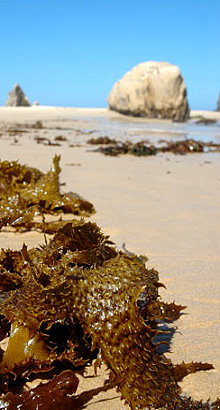
Sea kelp has encountered a long history of medicinal value traced back to the ancient Greeks who valued sea kelp for the treatment of intestinal and thyroid gland disorders. The benefits became undeniable and sea kelp progressively found its way into herbalism where it was prescribed as a treatment for obesity, goitre, poor digestion, and persistent constipation.
Sea kelp has since also demonstrated curative and normalising effects on the sensory nerves, arteries, pylorus region, kidneys, liver, pancreas, gall bladder, bile duct, colon, prostate gland, uterus, ovaries and testicles. Research studies have proven just how valuable sea kelp is to our health. There is now irrefutable evidence that Japanese women who consume sea kelp regularly have lower rates of endometrial, ovarian, and breast cancer.
This magnificent 'ocean herb' is essentially the richest known source of organic iodine which is crucial for the prevention and treatment of iodine deficiencies. Iodine is imperative to the proper functioning of the pituitary gland and thyroid gland, and is a major constituent of thyroid hormones. Thyroid hormones are required for normal development, and regulating metabolism and body temperature. Sea kelp therefore offers plausible advantages to people striving to maintain a healthy body weight as regulating metabolism is vital to achieving this goal. Supporting the pituitary gland and thyroid gland also makes sea kelp the superhero of supplements for superior hair and nail health.
Sea kelp is an especially important addition to a women's diet because it encompasses many other necessary nutrients such as iron, calcium and potassium. Since these important minerals are essential to maintaining good health, and usually lost during monthly cycles, pregnancy or lactation, women should take advantage of all that sea kelp has to offer. As this amazing 'ocean herb' has the added benefit of a natural antibiotic incorporated, sea kelp will assist the body by strengthening the immune system for fighting infection, which is especially helpful during cold and flu season, or for those individuals who are predisposed to sinus congestion due to allergies. The iron and magnesium in sea kelp is advantageous to a healthy bloodstream by creating a friendly environment for the development of myoglobin and hemoglobin. Iron and magnesium are responsible for increasing the level of energy, improving the immune system, regulating blood pressure, and assisting in the assimilation of other constituents such as vitamins, minerals, and trace elements.

Comprising of more than sixty essential vitamins, minerals and trace elements, sea kelp is progressively being acknowledged as a superior natural source for the essential nutritional requirements. Certainly worth noting is that sea kelp contains calcium, copper, iodine, iron, magnesium, manganese, phosphorus, potassium, zinc and natural sea salt. It boasts the highest natural concentration of calcium than any other food source measuring at ten times more than milk.
Sea kelp is high in fibre, protein, vitamins A, B, C, E, K, riboflavin, folate niacin, beta-carotene, and other antioxidants that researchers believe may play a role in cancer prevention. Sea kelp has proven to be an effective treatment for ailments such as headaches, stress, ulcers, indigestion, constipation, and others of a more serious nature such as kidney, liver or respiratory failures. Sea kelp can also assist with weight management or weight loss, and even irritability, depression and lack of energy. Sea kelp is an alkaline food, therefore an indispensable inclusion to the diet for maintaining acid base balance within the body and an effective addition to a healthy acid alkaline diet.
Recent concentration on the diets of cultures with a history of exceptional health and longevity has also accentuated the role of sea kelp. The Japanese culture in particular has attracted a great deal of attention, with sea kelp traditionally accounting for as much as twenty five percent of their diet. Sea kelp is now gaining popularity in Australia and the western world as an exceptional natural food source. Vegetarians and especially vegans who avoid dairy and animal products should consider including sea kelp to their diet because as healthy as these diets are, they are most certainly lacking in particular nutrients and minerals necessary for maintaining a healthy lifestyle. Today, as new super foods and miracle diets frequently emerge on the internet and health market, many individuals are progressively returning to tried and true natural products like sea kelp.
Overcome Chronic Sleep Deprivation!

It is estimated that up to 45 percent of the world's population recurrently suffer from a disorder of sleep and restlessness, attributing to the impediment of daily functioning and adversely affecting health and longevity. According to the International Classification of Sleep Disorders, there are currently about 90 separate recognised sleep disorders consisting of symptoms including extreme daytime tiredness, narcolepsy, insomnia, difficulty in maintaining sleep, restless legs syndrome, sleep breathing disorder, irregular events or restlessness during sleep, and circadian rhythm sleep disorders.
The collective long term effects of sleep disorders and sleep loss have been closely associated with a wide range of detrimental health consequences including an increased risk of hypertension, depression, diabetes, obesity, heart attack, and stroke. After now decades of research, the case can be conclusively made that sleep disorders and sleep loss do have overwhelming implications on human health. These bothersome common conditions of sleep disorders and sleep loss are frequently overlooked but are amongst the most readily treatable health problems. Quite often questions relating to your sleeping habits are not asked by physicians so therefore disorders such as sleep breathing disorder remain undiagnosed. Failing to recognise sleep disorders not only prevents diagnosis and possible treatment, but also prohibits the possibility of preventing the serious public health consequences.

The public health consequences of sleep related disorders are far from being trivial, the most noticeable consequences to many of us would be those errors in judgment when we are unable to think clearly, or by sometimes committing ourselves to events that we would not usually attend.
The less noticeable consequences of sleep disorders are far more disastrous and often take a toll on nearly every aspect of public health such as performance, accidents and injury, family well being, health care, quality of life, and mortality. Some of these consequences will occur within minutes of the sleep disorder, such as an accident or injury, and therefore are relatively easy to link to a sleep disorder. Others develop more insidiously over months and years of chronic sleep problems such as hypertension, obesity and numerous other illnesses.
The World Association of Sleep Medicine reported that both adults and children are struggling to cope with an epidemic of sleep disorders including insomnia, obstructive sleep apnea, restless legs syndrome and sleep deprivation in general. On average a male will sleep about eleven minutes less than a female at night, but studies have shown that females have a higher rate of difficulty falling asleep and maintaining sleep. A male or female who has not slept for twenty hours has a level of impairment equal to an individual with a blood alcohol concentration of .08 percent, certainly over the limit of .05 percent at which a driver is usually considered to be legally impaired.
The association also reported that sleepiness and sleeplessness are an extreme threat to health and quality of life in countries around the globe, adding that it can be hazardous to health and safety to reduce the recommended hours spent sleeping. An uncharacteristic sleep pattern from shift work disrupts the natural pattern of rest and rejuvenation, which may increase the occurrence of physical and mental disorders including asthma, depression, hypertension, diabetes, and cardiovascular disease. Persistent sleep deprivation can contribute to diabetes, obesity, high blood pressure, heart attack and stroke, and numerous other medical conditions. Further studies have shown that just an extra hour of quality sleep per night appears to reduce the risk of hardening of the arteries, or coronary heart calcification, which is an early indication of cardiovascular disease. The quantity and quality of sleep have been proven to affect appetite, weight management, and the efficiency of a weight loss diet.

The increase in sleep deprivation does seem to be driven largely by widespread societal changes, including the now greater dependence on longer work hours, shift work, and the requirement to access the Internet. At least twenty percent of individuals worldwide are engaged in some kind of shift work, of whom there is an increasing number of night shift workers enduring disruption of circadian rhythms and chronic sleep deprivation. Certainly one indication is the increasing number of adults departing for work between midnight and dawn, this number has grown over the last ten years by 24 percent.
Also contributing to the rise in sleep deprivation is the fact that many individuals are opting to either work from home or take work home with them after the work day has finished. The convenience of the Internet has increased the workload and extended the work day for many individuals that do not observe a healthy work-life balance.
The causes of sleep deprivation is multifactorial, falling under two major, sometimes overlapping categories: Lifestyle and Occupational such as irregular sleep patterns due to travelling or jet lag, prolonged working hours due to regular overtime, or shift work, and Sleep Disorders such as narcolepsy, insomnia, sleep breathing disorder, restless legs syndrome, and circadian rhythm disorders. Unfortunately, the epidemiological data that is available is not adequate enough to determine the extent to which sleep deprivation is caused by pathology versus behavioural elements. Certain successful individuals boast of only requiring a few hours sleep each night or not having enough time in their busy lives to sleep properly, but the reality is that we all require adequate sleep to function properly, both physically and mentally. There is nothing noble about depriving your mind and body from its much needed rest and recuperation!
Dandelion for Effective Detoxification!

Although the dandelion (Taraxacum officinale) is still considered as an unrelenting weed infesting grass lawns across suburbia, this unassuming plant is now the focus of innumerable scientific studies investigating its apparent capability to combat various types of cancer.
The widespread weed called dandelion is actually a nutrient rich plant that presents many healthy benefits, and has been used for centuries in Native American and Chinese medicine. The dandelion is one of the finest plant sources of beta-carotene, vitamin A, and also contains a rich source of calcium, fibre, iron, magnesium, potassium, phosphorous, protein, riboflavin, thiamine, and vitamins C, H and K.
The International Journal of Oncology published a clinical study in 2008 showing that dandelion leaf decreased breast cancer cells and prostate cancer cells. In 2011 the Journal of Ethnopharmacology published a study showing that dandelion root tea killed leukemia cells by the way of a process called apoptosis (programmed cell death). These researchers discovered that dandelion root tea created a 'switching off message' of leukemia cell receptors, but did not broadcast the same 'switching off message' to the healthy cells. More recent medical studies have produced evidence that dandelion is capable of suppressing the growth of several forms of cancer.
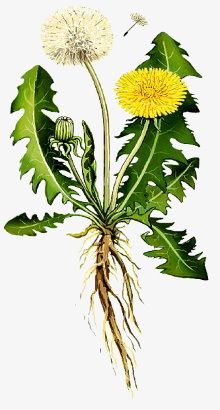
The dandelion is a perennial plant with jagged-edged bright green leaves extending to approx 25cm long, with a hollow flower stem extending to approx 25cm, sporting one yellow or orange daisy. When flowering has ceased, the flower head then converts to a puff-ball like seed head releasing fluffy parachutes specifically designed to carry each new seed with the wind. The smooth uneven bright green jagged-edged leaves resemble backward facing teeth, and is the reason for naming the plant dandelion, which originates from the French 'dent de lion', meaning lion's tooth.
Consuming dandelion root tea or dandelion leaf tea regularly has proven to be highly beneficial for individuals experiencing gall bladder or liver complaints. Studies have found dandelion to be an effective component in liver cleansing formulas, as it stimulates the flow of bile from the liver and assists in the breaking down of liver fats.
The dandelion leaves can be ingested regularly as a preventative measure, whilst also aiding the liver to perform at maximum efficiency. Furthermore, as the dandelion leaves are also an invaluable alkaliser, they can neutralize acidity from within the body, purify the blood, oxygenate the blood, and rejuvenate cells. The bitter principles also encourage digestion by salivation, and the creation of enzymes and stomach acids. By stimulating the gallbladder, liver, pancreas and spleen activity, the body becomes more efficient in digesting and eliminating fats and oils.
Regularly ingesting dandelion has also proven beneficial in the stimulation of mucus membranes, soothing the digestive tract, absorbing toxins from the bowel, and discouraging destructive bacteria, therefore aiding favourable flora to thrive. Reports have also suggested that regular dosage of dandelion root is effective in dissolving gallstones and preventing new stones from forming. Dandelion has proven beneficial for individuals that suffer from anaemia, allergies, arthritis, asthma, low blood pressure, bone disorders, cardiac edema, high cholesterol, poor circulation, colds, constipation, eczema and other skin conditions, hot flushes, gall stones, swollen glands, gout, heart burn, halitosis (bad breath), metabolic disturbances, rheumatism, sleep deprivation and fatigue, malignant tumours, and ulcers.
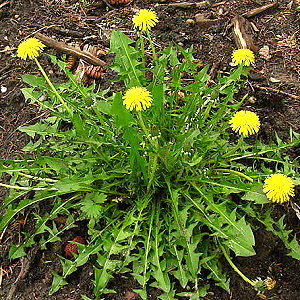
Ingesting dandelion has been reputed to relieve the symptoms of diabetes, the following combination of herbs taken immediately after each meal has proven effective (2 parts dandelion, 1 part fennel, half part ginger and 1 part elecampane). Dandelion also supports outstanding fat metabolising activity, for weight loss or weight management, consume several cups of dandelion root tea daily, adding one or two tablespoons of cider vinegar to each serve.
The young dandelion leaves and flower petals can be tossed in salads, steamed, or added to stir-fries. For dandelion leaf tea, add six broad, tender dandelion leaves to boiling water and allow infusing or steeping for 10 minutes. Dandelion roots can be roasted and broken into small pieces before infusing or steeping to formulate a caffeine free coffee substitute.
* Note: When infusing or steeping dandelion, the solution will be clear and there may be some doubt as to whether the steeping has actually occurred, for this reason I choose to use 'course ground roasted dandelion and chicory root'. The chicory root will discolour the water giving peace of mind that solution is ready to consume!
A dandelion wash to relieve inflamed eyes, facial blemishes, or eczema flare ups can be prepared using the same steeping method as above and allowing to cool before applying externally. For this solution, or wash, the dandelion leaves, stems and flowers are also included. The white sap from the stems, if placed on warts several times a day is a powerful solution causing the warts to shrivel and eventually disappear.
* Please Note: The use of herbs is an ancestral approach to treating disease and strengthening the immune system. Please be aware that herbal dietary supplements can trigger side effects in certain individuals, or interact with other supplements, or medications. Individuals should take the necessary precautions and consult with their healthcare professional prior to embarking upon alternative medicinal treatments.
Chia Seeds are Essential Fatty Acids!

Salvia hispanica L, or more commonly known as chia, is a genus of flowering plant belonging to the mint family, native to central and southern Mexico. Historic writings provide evidence that humans were using chia seeds approximately 3500 BC. The ancient Aztecs and Mayans ingested chia seeds on a regular basis by either pressing them for oil, milling them into flour, or just consuming them after immersing in water. In fact the chia seed was actually a staple food for the Aztecs, treasured for its ability to sustain and to give endurance.
Even at this stage in history, chia seeds were already considered to be a super food source because of its capacity to increase energy and stamina for extended periods of time. It is believed that the name chia comes from the Mayan language meaning 'strength', but there is also claims stating that the name chia may have come from the Aztec word 'chian', meaning 'oily'.
These days, chia seeds are considered a super food source because they provide the maximum amount of nutrients while delivering minimum calories. The chia seeds share several of the same health benefits as the more renowned flax seed, but chia seeds do not require milling or grinding for the body to reap the health benefits. Chia seeds are an unprocessed whole-grain food source that is easily digested and absorbed by the body from the seed form, unlike flax seeds. The nutritional health benefits of chia seed include omega-3 fatty acids, calcium, antioxidants, carbohydrates, protein, fibre, vitamins and minerals. Actually, if need be, you could probably live off chia seeds almost entirely for extended periods of time because chia seeds contain 19 amino acids, including all of the essential amino acids.
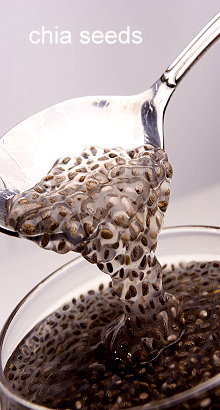
The chia seed is capable of absorbing up to twelve times its own weight and expands when immersed in liquid, therefore restraining your appetite, so including just an ounce of chia seeds to your daily diet can immediately reduce caloric intake and double the amount of fibre you would normally receive. Contributing to its weight managing benefits, chia seed is also one of the most concentrated natural sources of omega-3 of all food sources.
Chia seeds also contain high levels of omega-6. The Food and Drug Administration has declared that chia seed is a food source rather than a supplement, and therefore can be consumed without restrictions.
As our body cannot naturally produce essential fatty acids (EFAs) internally, individuals are required to consume high levels of EFAs in their diet to allow the body to build new cells, and to regulate various bodily functions. EFAs also support circulatory, cardiovascular health, and healthy skin, hair and nails. Pregnant women would most certainly benefit from adding chia seed to their diet as omega-3 is required for brain health of their developing babies. Many women are concerned about consuming seafood because of the reported high mercury content, chia seed may be a safe way to introduce essential fatty acids to your diet without the risk of ingesting mercury.
While the Dietetic Association's recommend a daily fibre intake of approximately 20 to 35 grams, unfortunately most of us are falling short and only reaching approximately 12 to 15 grams per day. By including just an ounce of chia seeds to your daily diet, you can receive 42% of the recommended daily fibre intake in one serving. Including fibre to the diet is essential for all aspects relating to good health and is particularly important for proper digestion and weight management. Fibre is also essential in the prevention of constipation, bowel cancer, and slowing the absorption of sugar into our blood stream.
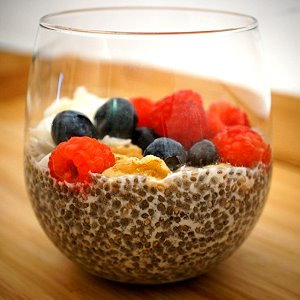
Calcium deficiency is also becoming a concern with the increase of osteoporosis. Osteoporosis is a serious health problem characterised by fragile and porous bones. By including just an ounce of chia seeds to your daily diet, you can receive 18% of the recommended daily calcium intake in one serving. For those that follow a strict vegetarian or vegan diet, or those individuals that avoid dairy products would most certainly benefit by including chia seeds to their diet.
There are two distinct chia seed colours, black and white. Any nutritional difference between black and white chia seed is negligible, and more likely due to the conditions in which the seed was grown than the colour of the seed itself. There are various ways to introduce chia seeds to your diet, basically you are only limited by your imagination. Try sprinkling them on cereal or even salads, add then to smoothies or protein shakes, include chia seeds when baking breads, cakes, biscuits, or beef up your weight loss puddings. Many people like chia seeds while they are still crunchy and choose to add them to meals just prior eating, so there is no need to wait till they swell.

Natural Approach for Kidney Stones!

Overweight individuals seem to be at a higher risk of developing kidney stones. A Harvard University professor studied men and women over a twenty year period comparing their risk of developing kidney stones in relation to their weight. The study revealed that the heavier females faced an 89 percent greater risk of developing kidney stones than the lighter females, and that the heavier males faced a 44 percent greater risk when compared with the lighter males. It was also noted that simply gaining considerable weight as an adult also increased an individual's chances of developing kidney stones.
The kidneys function is to filter the blood by eliminating additional water and waste in the body by the way of urine. Many waste chemicals in the urine can occasionally form crystals that mass together forming stones.
Kidney stones are basically hard rock type crystals of varying shapes, and sizes ranging from a grain of sand to the size of a golf ball. Kidney stones are a painful chronic condition and can quite often also be found in healthy patients, and most certainly a common disorder of the urinary tract.
Caucasian adults between the ages of 20 and 50 appear to be more susceptible to developing kidney stones, and after developing the first stone they are more likely to develop further stones in the future.
Stones form from various substances, but more commonly they are caused by crystallised calcium and oxalate in the urinary tract. Other stone types may also include cystine, struvite, and uric acid. Whilst the stones are painful enough for the individual, they can also lead to more serious disorders such as an obstruction in the urinary tract causing acute infections and permanent kidney damage.
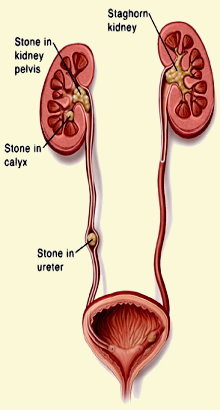
Conventional medical professionals usually take a varied approach to the treatment of kidney stones, including the use of shock waves to break down the stone into smaller passable pieces, various medications to attempt to dissolve and prevent the forming of future stones, or surgical removal.
Although there are dietary guidelines for the prevention of future stones forming, these guidelines are more so based on the constituents of the stone and not the true cause and effect as to why the stone actually formed.
Traditional nephrologists applying natural treatments to target kidney stones have suggested the use of lemon juice combined with water as being an effective treatment. Whilst lemon juice has been praised as an effective alkalising and cleansing beverage, the major reason lemon juice has proven beneficial in the reduction of kidney stones is because of the high citric acid content. Citric acid impedes the formation of kidney stones and breaks down smaller stones that may be starting to form.
* Please Note: Citric acid should not to be confused with Ascorbic acid, or Vitamin C! Citric acid or Citrate binds with the calcium in the urine decreasing the level of calcium available to form calcium oxalate stones. Citrate also prevents minute calcium oxalate crystals that are already present in the kidneys from massing together. Also by rendering the urine less acidic, the development of both calcium oxalate and uric acid stones are inhibited.
The natural approach to targeting kidney stones will require half a cup 125ml (4oz) of fresh lemon juice added to water and consumed daily. This beverage can either be consumed all at once or if you prefer, try adding half a cup 125ml (4oz) of fresh lemon or lime juice to a 1 litre (32oz) bottle of water and consume at your leisure throughout the day. Including a measure of cider vinegar would also prove beneficial as cider vinegar is an excellent alkalising agent and contains citric acid as well. This natural remedy is equivalent to taking a potassium citrate pill, which is one of the standard pharmaceutical kidney stone treatments.
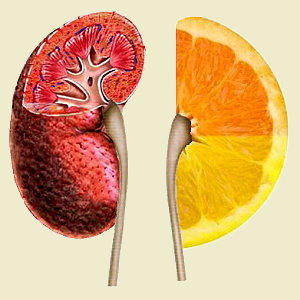
Those individuals who are prone to kidney stone formation should also be very conscious of their salt intake because an elevated sodium excretion will most likely cause an elevated level of calcium excretion in the urine. Studies have verified that excessive sodium intake is associated with increased urinary excretion of sodium and calcium, therefore individuals that consume high levels of sodium tend to have a greater urinary calcium excretion. Elevated calcium excretion may lead to the formation of kidney stones particularly if fluid intake is inadequate. Even if you are following a diet that is low in processed foods, you may still be consuming a considerate amount of salt via food items such as canned or preserved foods, cured meats like bacon, or fermented condiments like pickles. Whilst a certain amount of salt is required in our diet, consuming regular portions of bacon for example, and very few plant type foods is most likely going to push you over your sodium requirements without matching that sodium intake with potassium. Potassium is the essential electrolyte that can actually counteract the negative effects of excess sodium. Make sure to include good sources of potassium, such as bananas, white potatoes, leafy greens, squash, and avocado if your diet involves consuming high sodium level foods.
So as you can see, even if you are following a reasonably healthy diet, this does not guarantee that you will be resistant to developing kidney stones. Whilst following a healthy balanced diet it is still easy to miss out on some of the key nutrients required to prevent stones from forming, especially if you are not eating a varied diet with emphasis on nutrient dense foods.

Bee Propolis Supporting Longevity!
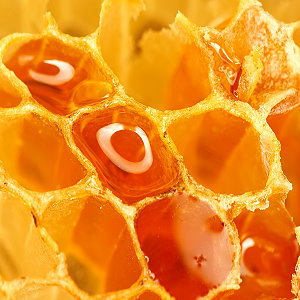
Since ancient times, bee propolis has been regarded as one of nature's most interesting and exclusive substances. Resins are collected by the bee from plants and trees, and then combined with wax at the hive to produce propolis. This propolis, being of a sticky nature, is used to seal and glaze honeycombs to create the perfect sterile environment that is free of microorganisms and secure from other invaders. It has been said that the bee hive is certainly one of the most sanitary environments.
After the collection of these resinous substances, the worker bee begins processing this organic yield by adding wax, secretions from the salivary gland (that contain enzymes), and other biochemical compounds. Closer inspection of the organic yield has determined that it consists of resins from at least twenty species of trees and also the tiny buds of alder, ash, beech, birch, chestnut, pine, and poplar trees. It seems that the collection of these organic products is not only limited to resins and buds, as the young stems, petiole (leafstalks), leaves, branches, and bark of the plum and willow tree were also discovered.
The chemical composition, aroma, and colour of propolis will fluctuate according to the combination of raw materials, and the flora collected. Further studies and observations relating to the collection of the raw materials has determined that the organic yield is gathered according to colour (brown, green, red, yellow, and white) and these materials are transported on the rear legs of the bee along with the pollen. The harvesting of bee propolis requires gently scraping off the fine layer of organic material from the hive walls and honey comb, is done on warm days with temperatures above 20 degree C (68 F) by proficient beekeepers.
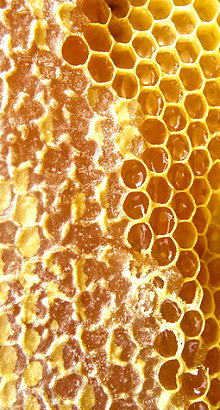
Acknowledged for centuries for its medicinal qualities, bee propolis is suitable for both internal and external applications. The early Egyptians, Greeks and Romans used bee propolis for the healing of wounds. At around the 12th Century, bee propolis was used to aid in the healing of throat infections and mouth ulcers. During the first and second world wars bee propolis was used extensively on wounds to diminish infection and speed up the healing process. Contemporary applications have now extended to dental care, digestive health, immune support, skin care, and cancer treatment. Certainly a highly beneficial substance for human health!
With ongoing research, more medicinal applications of bee propolis are being revealed and better understood. Studies have already revealed that bee propolis is a rich source of nutrients and other key elements such as flavonoids. Flavonoids (or bioflavonoids), also communally known as Vitamin P and citrin, are responsible for the anti-inflammatory, anti-bacterial, anti-fungal, anti-viral, and anti-tumour activity.
One significant area of medical focus is the effective immune supporting activity of bee propolis. Propolis supports the immune system by actively encouraging the human body's natural defences and resistance to fungal, bacterial, and viral infections. Propolis stimulates the creation and activity of macrophages, immune cells implicated in the defence against microbial attacks in the development of antibodies. In other words, increasing the annihilation of potentially harmful foreign bacteria, and stimulating the creation of antibodies to build immunity to numerous diseases. This intensification of cellular defence also assists in building resistance to illness and the signs of aging. Strongly considered throughout history as nature's wellness formula!
By disrupting the propagation of bacterial cells and preventing cell division, therefore dismantling the cell structure, bee propolis reduces the life and spread of bacteria both internally and externally. Laboratory studies investigating the anti-inflammatory properties of bee propolis have discovered that certain elements prevent the manufacture of prostaglandins, pro-inflammatory hormone-like substances that occur naturally within the body. By preventing the manufacture of prostaglandins, bee propolis is highly effective in reducing inflammation within the body.
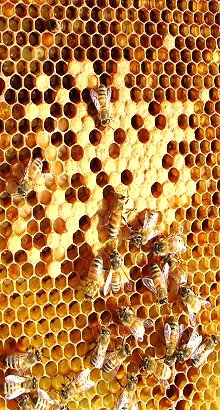
More recent studies have explored the application of bee propolis in cancer treatments. Research has acknowledged the ability for bee propolis to suppress the growth of human tumours associated with cancer and neurofibromatosis. The idea is now seriously being entertained that bee propolis may also promote the death of cancer cells by the way of apoptosis (programmed cell death). Researchers examined the capability of bee propolis constituents to prevent tumours from creating their own blood supplies. When the blood supply to a tumour is removed, the tumour can no longer obtain nutrients to fuel its growth.
As bee propolis has already proven to have effective anti-inflammatory properties, treatment has extended to similar disorders such as allergies, arthritis and asthma. This unassuming bee product has even proven highly effective against Methicillin Resistant Staphylococcus Aureus (MRSA), the antibiotic resistant bacterium that has plagued many nursing homes and hospitals where patients are at greater risk of infection.
Bee Propolis is obtainable in a wide assortment of products found in health food stores and pharmacies, products may include tablets, capsules, extracts, powders, lotions, ointments, creams, and other cosmetics.
* Please Note: If you are allergic to bee venom (bee stings) then caution should be used when trying bee products. Seek advice from a recognised healthcare professional before attempting to use!
The humble bees and their products have provided us with nourishment and wellness for centuries. Considering all of the bee products, bee propolis is proving to be one of the most interesting, exclusive and beneficial in regards to long term health and well being. Bee Propolis is an exceptionally complex product that contains elements that prevent and treat disorders ranging from the common cold to acute and chronic diseases. We are indebted to the bees for the superb products they provide for our enjoyment, health and survival. It is important to ensure their lives are sustained and protected!

Probiotics Promote Healthy Digestion!

You may have noticed advertisements claiming that probiotic yogurt contains 'live active cultures'. The reference to 'live active cultures' suggests that the probiotic yogurt contains beneficial living organisms specifically proposed to assist the body in regards to digestion. Considering the nature of advertising, and that the word 'probiotics' is a fashionable key word used by advertisers to sell health foods, surprisingly this claim is actually true and not a marketing ploy.
Probiotics do in fact promote healthy digestion. What is not usually mentioned though is that like all living organisms, probiotics require nutrition to survive. The responsibility of supplying nutrients to the probiotics is taken on by prebiotics. In contrast to probiotics, prebiotics are not living organisms. Prebiotics are the nutrients and food source required by probiotics to encourage probiotic activity in the gastrointestinal tract. When probiotics are ingested they immediately commence inhabiting the digestive tract with beneficial bacterial colonies. Probiotic colonies reside in a hostile environment and require prebiotics from 'fibre rich food sources' to remain strong.
Probiotics are friendly bacteria that form part of our natural intestinal flora. The benefits of probiotic bacteria encompass proper digestion of our nutrient intake, long term intestinal health, and even produce nutrients such as folate, vit B12, and vit K. Intestinal health has a significant impact on the body's development during early childhood. Probiotics have been recommended for intestinal distress and inflammatory bowel disease. Oral and periodontal healthiness also reacts positively to probiotics. As antibiotics do not differentiate to the type of bacteria they destroy, probiotics are frequently taken during antibiotic treatments to maintain a healthy internal balance. Probiotics boost the population of favourable bacteria in the gut, therefore improving not only the digestion and elimination functions, but also benefiting all other aspects of the body's health that rely on these functions. The immune system is being exercised daily because the hostile environment of the gut is constantly encountering foreign substances from the food we ingest, therefore making the gut a vital line of defence against invasive pathogenic bacteria.
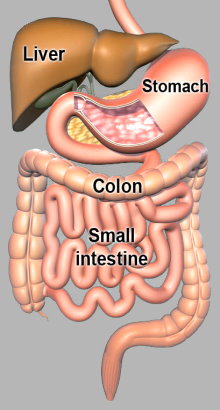
Research studies propose that certain probiotics can even suppress the mechanisms that lead to autoimmune disorders and sensitivity to dust, pollens, and other environmental debris. General breathing ability was also revealed to be positively affected by probiotic bacteria. Researchers even concluded that probiotics reduce intestinal transportation time, therefore assisting to promote regular bowel movements. Probiotics have even exhibited some benefit in relation to serotonin levels, consequently providing supplementary support against anxiety and cognitive decline. Considering the fact that 90 percent of serotonin creation and regulation occurs in the gut, these findings are very encouraging.
Prebiotics are non-digestible carbohydrates like soluble plant fibre that provide nutrients for the probiotics. The benefits of prebiotics are two-fold, not only do prebiotics support probiotic colonies to thrive, they also promote general health and wellbeing. Associated prebiotic benefits include laxation, vitamin assimilation, mineral absorption, metabolic support, and immune system support. Further research has claimed that prebiotics may also promote normal blood sugar levels. As prebiotics affect each individual in a different way, the current intestinal health of the individual taking prebiotics should be considered. Recent studies have discovered that people suffering from gastrointestinal illnesses such as Crohn's Disease or Irritable Bowel Syndrome may exacerbate their symptoms by taking prebiotics.
A variety of bacteria live in the intestines in a parasitic relationship that is of benefit to both the body and to them. Lactobacillus bacteria belong to a class of bacteria identified as lactic acid bacteria. Bifidobacterium create lactic acid as an end product of fermentation. Lactic acid bacteria ferment foods, which lowers the pH level and prevents harmful bacterial growth. There are a wide range of probiotic strains, the most commonly used strains are Lactobacillus acidophilus, Lactobacillus casei, Lactobacillus GG, and Bifidobacteria.
Yogurt is the best known source of lactic acid bacteria, but not all yogurt products contain significant levels of the live cultures of lactobacillus or bifidobacterium because the bacteria generally do not survive the manufacturing process. To counteract this issue certain yogurt manufacturers have added live cultures to their products. If you are lactose intolerant, you may find yogurt with added live cultures easier to digest since the bacteria produce lactase, the enzyme that breaks down lactose. Kefir and buttermilk are other dairy foods containing live active cultures.
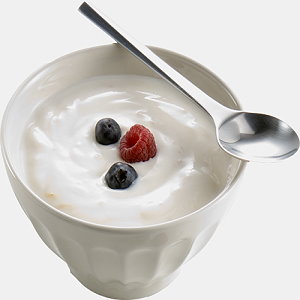
Various cultures consume fermented cabbage and other vegetables of the like found in sauerkraut, pickled vegetables, and Korean kimchi. Fermented vegetables that have not been subjected to the manufacturing process that kill lactobacilli can have probiotic effects.
Miso (traditional Japanese seasoning produced by fermenting soybeans with salt and the fungus Aspergillus oryzae), tempeh (traditional Indonesian soy product produced by natural culturing and controlled fermentation process that binds soybeans into a cake form similar to a firm vegetarian burger patty), umeboshi (type of Japanese pickled plum also known as salt plums), and pickles along with a number of other fermented vegetables may contain active cultures of lactobacilli, but only if they have not been pasteurized or subjected to high heat.
Prebiotics are mainly derived from fibre, like inulin (a group of naturally occurring polysaccharides produced by various types of plants). Often, yogurt marketed as probiotic yogurt will contain inulin (prebiotic) and live active cultures (probiotic). Other high-quality sources of prebiotics include chia seeds, chicory root, dandelion greens, garlic, asparagus, beans, oats, and acacia gum.
Many individuals consume probiotics purely for healthy digestive purposes, or to rectify a bacterial imbalance in the gut caused by illness, aging, medication, processed food, environmental pollutants, or even stress. In a healthy gut, there is a balance between favourable and pathogenic or unfavourable bacteria. When there is a disruption to this balance leading to an excess of unfavourable bacteria, health problems may occur. It is necessary to achieve internal harmony before considering optimisation. Studies have also concluded that each individual's gut bacteria balance is unique.
Very few individuals can truly claim that their diet and lifestyle is perfect, this is just the fact of life in society today. We can, however, still endeavour to gain the most out of life by exercising regularly, consuming a healthy diet, and more importantly, gaining maximum benefit from the food we consume by considering the benefits of probiotics.

Vitamin Supplements Restore Balance!
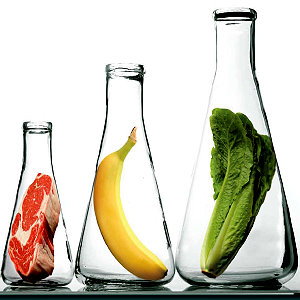
Do vitamin supplements actually encourage good health and reduce the risk of illness? Well this is the question that has been asked, and argued for decades. There are some individuals stating that if you consume a healthy diet there is no need for vitamin supplements, then there are other individuals concerned about the current quality of food sources who mega dose vitamin supplements on a daily basis. The true answer to this controversial topic is probably somewhere in between.
Vitamins are actually organic compounds that contribute to a variety of metabolic functions. The consumption of vitamin rich food sources for the treatment of medical conditions dates back to the ancient Egyptians. Strong interest in vitamins and various other essential nutrients escalated in the 19th Century. The first vitamin to be isolated was vitamin C, and then a number of B group vitamins were identified because of their ability to reverse and prevent specific illnesses.
Most healthcare professionals will support the action of taking a daily multivitamin supplement. A multivitamin supplement supplies the nutrients lacking from our daily diets. Many of us do not obtain adequate vitamin intake derived from our diet for various reasons. In the fast paced world of today, many of us just do not eat the right combination of foods. In addition, many essential vitamin benefits are derived from food sources that certain individuals can not eat, or do not like to eat. For efficient functioning organs our body requires these vitamins, so consuming vitamin supplements is an ideal method for gaining these vital nutrients. Vitamins are defined as primary nutrients that are required in regular minute quantities. From multi vitamin supplements that present the missing required nutrients from consuming the wrong food sources, to supplements that boost energy, ward off disease, enhance libido, and strengthen immunity, the vitamin supplement benefits are significant.

Certain vitamin types are present in most varieties of natural food sources. Consuming a healthy balanced diet consisting of fruits, vegetables, red meats, fish, poultry, legumes, seeds, nuts, cereals, breads, and dairy, will ensure that an individual receives an adequate amount of the required vitamins. Unfortunately, due to our fast paced lifestyles, individuals are quite often opting for convenient meals or fast food.
Another point to consider is today's standard quality of our fruit and vegetables. Farmland soils are suffering considerable degradation and mineral depletion due to over farming in the intent to meet demand. It has also now become standard practice for produce to be picked prematurely and not left to naturally ripen on the trees or vines. The combination of forfeiting the natural ripening process and soil degradation is subsequently rendering the fruit and vegetables more nutrient deficient than they once were. So even those individuals that truly believe they do eat well, may still not be eating a high nutritional diet.
Introducing an accurate balance and sufficient level of essential nutrients to the body is necessary for a variety of complex bodily processes to occur. These essential nutrients assist in supporting normal function of our internal organs, skin, hair, eyes, teeth, bones, nerves and blood cells. The introduction of certain vitamin supplements also assist in the processing of carbohydrates, proteins, and fats. These particular vitamin supplements are designed to convert carbohydrates and fats into energy, and to assist in forming new tissue and bone.
* Please Note: Ingesting large quantities of organic compounds (natural sources) can in fact be counterproductive to your health, and consuming large dosages of vitamin supplements should not even be considered without the recommendation of a qualified healthcare professional or under strict medical guidance.
When vitamin supplements are consumed according to the recommended daily allowance (RDA) or the recommended dietary intake (RDI), they are introduced to the body at levels that could never be accomplished by eating even the healthiest of diets. Caution should be taken though, as individuals indulging in supplementation can also find themselves dosing predominantly on a single vitamin compound alone. When vitamins are consumed from the natural food sources, there are various compound companions to assist, for example, vitamin A (beta-carotene) from the natural food source is accompanied by various carotenoid relatives. There is also the issue of body absorption to consider with certain vitamin supplements. If you were contemplating the supplementation of your diet with calcium for the purpose of strengthening your bones, the perfect companion vitamins would be magnesium and D3, otherwise without sufficient levels of magnesium and D3, the benefits of the extra calcium may be utilised by your teeth or hair instead.

The human body requires 13 different vitamins in order to function efficiently. These vitamins can be divided into two groups: Fat Soluble vitamins (A, D, E, and K) and Water Soluble vitamins (B1 Thiamine, B2 Riboflavin, B3 Niacin, B5 Pantothenic Acid, B6 Pyridoxine, B7 Biotin, B9 Folate, B12 Cobalamin, and vitamin C). The vitamins A, D, E and K are fat soluble, meaning they can be stored in the liver and body fat for a long period of time. Exceeding the RDA or RDI of these vitamins, in particular vitamin A, over an extended period of time may result in dangerous levels of storage within the body, unless you have been medically diagnosed with a deficiency. Certain water soluble vitamins may cause side effects when exceeding the RDA or RDI, for example, vitamin B6 has been associated with causing nerve damage when taken in excess. The water soluble vitamins including B-complex and vitamin C are only stored for a short period of time and any excess is expelled from the body.
Factors that may contribute to nutritional depletion include illness, stress, dieting, pregnancy, prescription drugs, illicit drugs, processed foods, caffeine, alcohol, and strenuous exercise. Vitamin deficiency is actually uncommon, but the inadequate intake of certain vitamin compounds is not uncommon and has been associated with an increase of specific chronic diseases including osteoporosis, cancer and cardiovascular disease. Research continues to study the effects of consuming vitamin supplements for the prevention of chronic diseases, and evidence surrounding nutrition appears to be the key. Vitamin supplements can provide us all with levels of vitamin compounds to assist in reducing the occurrence of illnesses or disease, but please keep in mind that it is necessary to always consult with your healthcare professional before taking any high doses of vitamins.

Coconut Oil Supplies Vital Fatty Acids!
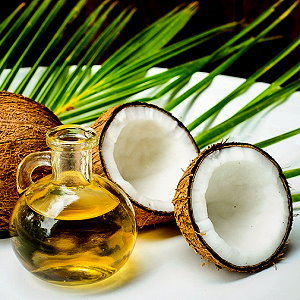
Although coconut oil received condemnation in the past for its apparent high levels of saturated fats and how these fats negatively impacted cholesterol levels, heart health and body weight, recent medical studies have now claimed that the exact opposite may now be true.
Extracted organic virgin coconut oil is actually proving to have some astonishing health benefits. The most significant finding would be the high levels of lauric acid, something not found in any other natural food source, other than breast milk.
When lauric acid is introduced to the body, it is transformed into a compound called monolaurin. The compound monolaurin is a monoglyceride that presents antifungal, antimicrobial, antiprotozoal and antiviral properties. It destroys organisms like fungus, bacteria and viruses by disrupting their lipid membranes. Monolaurin not only targets bacterial infections, but also lipid coated viruses such as influenza, measles, herpes, hepatitis C and HIV. Due to these much acclaimed strong antiviral properties, research in the Philippines continues to prove the effectiveness of lauric acid when used against the HIV (human immunodeficiency virus) and AIDS (acquired immunodeficiency syndrome). The distinct advantage of using lauric acid over modern pharmaceutical drugs to combat fungal infections, bacterial infections and viruses, is that lauric acid is basically non-toxic.
Neglecting to supply your body with sufficient levels of lauric acid means the body is unable to manufacture monolaurin and therefore these important health sustaining benefits are lost. People who consume coconut oil on a regular basis usually experience much less illness. The only other natural source containing high concentrations of lauric acid is breast milk, and this could explain the extreme decrease of all types of infection in breast fed babies. Due to the past bad press and criticism, manufacturers and consumers have avoided using coconut oil and replaced it with cheaper vegetable oils, thereby eliminating lauric acid from the regular dietary intake.
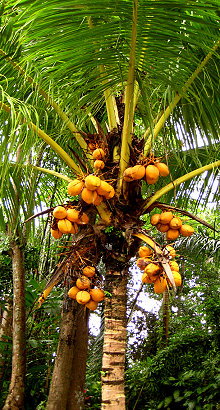
Although coconut oil is principally classed as a saturated fat, it does not negatively impact cholesterol levels. Actually organic coconut oil has proven to increase HDL cholesterol levels therefore improving the cholesterol profile. Furthermore to improving cholesterol levels, studies have also discovered lower levels of body fat, decreased susceptibility to blood clots forming, and higher volumes of antioxidants distributed throughout the body. Organic coconut oil has also proven to reduce the event of plaque build up within the arteries thereby assisting in the reduction of heart attack and stroke.
Another important factor of coconut oil that distinguishes it far apart from other saturated fat sources is that it incorporates medium chain fatty acids (MCFA), also referred to as medium chain triglycerides. Research studies have now demonstrated that the medium chain fatty acids found in coconut oil actually provide protection against heart disease and may soon even be used as a treatment. Coconut oil is nature's superabundant source of these health sustaining medium chain fatty acids (MCFA).
* Please Note: Elevated cholesterol level reports still support the critic's stance on coconut oil due to the fact that certain individuals believe they are free to consume whatever they want just because they take their three tablespoons of coconut oil a day. Let us just remember that cultures consuming the highest volumes of saturated fats would not have had access to the processed foods of today. Coconut oil has for many years been the major source of dietary fat for individuals residing in the tropics. The increased consumption of processed foods and sugar is now recognised as the contributing factors for the epidemic of heart disease we see today.
Combining the benefits of both short chain fatty acids (SCFA) and medium chain fatty acids (MCFA), studies in respect to nutrition and weight loss have linked colonic fermentation and microbial metabolites, in particular the short chain fatty acids (SCFA), acetate, butyrate, and propionate, to the management and regulation of energy metabolism. The medium chain fatty acids (MCFA) as found in organic coconut oil are also associated with the process of excess calorie burning, promoting fat oxidation, and reducing unnecessary food intake. The more common seed or vegetable oils incorporate long chain fatty acids (LCFA), also known as long chain triglycerides or LCTs. Long chain fatty acids have larger molecules, basically meaning they are more difficult for the body to break down and will usually end up being stored as fat.
The saturated fats as are found in organic coconut oil are an essential part of the cell membrane formation. These medium chain fatty acids such as capric, caprylic, and lauric having strong antifungal, antibacterial, antiprotozoal, and antiviral properties are vital building blocks for providing a boost to the immune system. Crucial white blood cells of the immune system are constantly engaged in combat against invading microbes and are also required for cleaning out the diseased and cancerous cells. Consuming organic coconut oil on a regular basis assists the body in eliminating disease causing bacteria and viruses therefore relieving stress and boosting your immune system. Regular consumption of the saturated fats from organic coconut oil has also shown to assist in regulating healthy thyroid gland functions and alleviating hypothyroidism symptoms such as depression, fatigue and low energy levels, constipation, dry and coarse skin, hair loss, water retention, and unexplained weight gain.
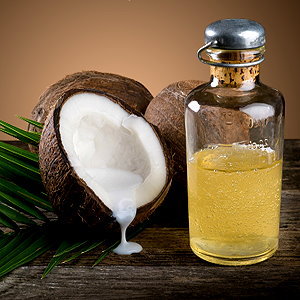
Organic coconut oil is beneficial for improving the overall digestive system thereby preventing the occurrence of various stomach and digestive function related problems such as irritable bowel syndrome. The anti-inflammatory and healing attributes of organic coconut oil assist by soothing inflammation and healing injury within the digestive tract, which is a characteristic of crohn's disease.
The saturated fat compounds present in organic coconut oil have antimicrobial properties that assist in dealing with numerous fungi, bacteria, and parasites that cause indigestion. Researchers now recognise that the medium chain fatty acids (MCFA) in organic coconut oil are digested quite differently than other fats. This digesting dissimilarity has led to significant applications in the treatment of various digestive and metabolic health conditions, and for MCFA to be consistently used in hospitals and baby formulas.
There appears to be no recommended daily allowance (RDA) or recommended dietary intake (RDI) for lauric acid, but researchers suggest that adults and growing children can most certainly benefit from an intake of 10 to 20 grams of lauric acid per day. It is interesting to note that nursing babies will consume about 1 gram of lauric acid per kilogram of body weight per day. You can obtain approximately 2 grams of lauric acid from one tablespoon of dried coconut, and most reputable brand coconut milk will contain approximately 3.5 grams per 60ml (2oz). Organic virgin coconut oil by far contains the very best concentration of lauric acid measuring at approximately 7 grams per tablespoon. Researchers recommend for the average person to consume about three tablespoons of coconut oil each day. To truly reap the full benefits of consuming coconut oil, make sure you choose a high quality source that offers coconut oil in its finest form, such as organic, cold pressed, virgin, or extra virgin.
As we all age, our internal organs do not function as well as they once did when we were younger. The pancreas does not create as many digestive enzymes, the intestines do not effectively absorb nutrients, basically the whole digestion function and elimination system moves at a much lower rate of efficiency. As a result, the elderly often suffer from vital nutrient deficiencies. Due to the fact that MCFA are easy to assimilate and will most certainly improve the absorption of amino acids, vitamins and minerals, it would be truly beneficial for those individuals experiencing deficiencies to include MCFA to their diet.
Sitemap Menu
Popular Articles









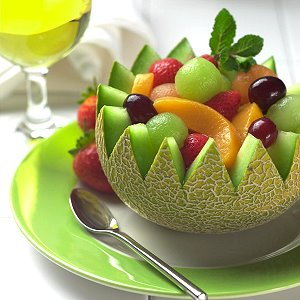
Herbs & Spices
Anise is a Mediterranean spice that, in the West, is used mainly to flavour confectionery. In its native countries it is an important flavouring for alcoholic drinks like raki, ouzo and pernod. Traditionally it is used to treat coughs. Anise contains limonene which is known to have an inhibitory effect against a number of cancers.
It also contains eugenol which inhibits platelet aggregation. This makes it a valuable spice to take in the prevention of cardiovascular events such as heart attack and stroke."
Black pepper is derived from the fruit of a climbing vine native to southern India and Sri Lanka. White pepper is likewise made from this fruit but is processed differently. By increasing the bioavailability of other anti-tumourigenic spices such as turmeric, black pepper dramatically increases their potency and effectiveness against various types of cancer.
It also counteracts cancer development directly. Its principal phytochemical, piperine, inhibits some of the pro-inflammatory cytokines that are produced by tumour cells."
The flowers, seeds and roots of this herb are medicinally used in the treatment of liver disorders. About 30 to 60 ml of decoction of the flowers, seeds or roots can be used three times daily, with beneficial results, in the treatment of torpidity or sluggishness of the liver, biliary stasis or, stoppage of bile, jaundice and enlargement of spleen.
Endive or chicory juice, in almost any combination, promotes the secretion of bile and is, therefore, very good for both liver and gall bladder dysfunctions."
Cinnamon is a spice obtained from the bark of Cinnamomum zeylanicum, a tree that is indigenous to Sri Lanka and now cultivated in several other tropical countries too. Cinnamon is a powerful inducer of insulin sensitivity making it an effective treatment for both Type II diabetes and metabolic syndrome.
It has also been used as a traditional medicine to treat a variety of ailments including colds and digestive problems, as a perfume, and for flavouring wines."
In addition to their culinary uses, they have mild analgesic properties and oil of clove has long been used in dentistry as a treatment for toothache. Cloves are loaded with many highly effective antioxidants including procyanidin and quercetin that give this spice the distinction of having the highest antioxidant activity of all foods!
There is also evidence that eugenol and acetate inhibit platelet aggregation and thus protect against heart attacks and thrombotic strokes."
It benefits both liver and gall bladder in their vital role of handling fats within the body and aiding the detoxifying role of the liver. It is, therefore, useful in the disorders of these organs. Combined with the juice of watercress and with a diet without meat or much sugar and starch, it helps to make the liver and the gall bladder normal, and exercises a beneficial effect upon the nervous system.
Sufferers from hepatitis can generally benefit from dandelion tea."
In traditional medicine, it has been used to treat a number of conditions including diabetes, sore throats, and in poultices used to treat sores and abscesses. Recent investigations into the medicinal properties of this spice suggest it is important not only as a preventive for chronic diseases such as diabetes, but also for enhancing normal physiological processes, especially with respect to athletic performance.
Another one of its properties is the reduction of platelet aggregation which, in turn, dramatically reduces the risk of abnormal blood clotting associated with heart attacks and strokes."
Garlic, which is the bulb of a plant native to the Himalayas and Siberia, is among the world's most important spices. Used across the globe as pungent food flavouring, in many societies it is employed as an important medicinal spice with an array of traditional uses.
These include its use as an antiseptic, anti-asthmatic, anti-rheumatic and as a treatment for coughs and colds. Over the centuries, it has also been employed against specific disease scourges, notably leprosy, plague and smallpox."
Ginger is one of the most popular of all the spices and is derived from the root of a plant indigenous to Asia which is now cultivated across the globe for use in an enormous variety of foods, drinks and traditional medicines. It is used in folk medicine to treat colds and influenza and is an effective anti-emetic used in the treatment of both motion sickness, and the nausea and vomiting associated with pregnancy.
Numerous studies investigating ginger's medicinal properties have also shown it to be effective in the prevention and treatment of many of our more serious chronic degenerative diseases."
Mustard is native to the Mediterranean region is derived from several varieties of mustard plant, each of which produces seeds of a different intensity and flavour. Not only do they help to protect against a variety of malignancies, including cancer of the pancreas, prostate, breast, stomach and colon, but as little as two or three servings per month may be enough for their anticancer properties to take effect.
In addition to being valued internationally as a spice, it has a notable history of use in traditional medicines and has been used to relieve headaches, as an emetic, for colds and flu and to treat arthritis."
Nutmeg is the seed, and mace the aril, of a tree native to Indonesia. It provides several important antioxidants, including eugenol which inhibits platelet aggregation and oleanolic acid which can lower blood lipids and therefore help to prevent cardiovascular disease. Nutmeg also contains limonene which has preventive properties against some cancers, and linalool which has anticancer and antiviral effects.
In high doses it has narcotic effects and can induce hallucinations."
Turmeric's root is ground up to provide the yellow dye and flavoured powder known as haldi in India, and turmeric in the West. Turmeric's main constituent phytochemical, curcumin, is one of the most remarkable and most studied of all the spice compounds. In addition to its other medicinal properties, curcumin is an extremely valuable chemoprotective agent.
Much of the research and interest in curcumin has centred on breast cancer, but it has also been found to have protective effects against cancers of the bladder, stomach, uterus and cervix."

Spirulina
Early recorded usage of spirulina dates back to the ancient Kanembu nation of the Lake Chad region of Africa in the 9th century, and then again from the ancient Aztecs of the Lake Texcoco region of Mexico in the 16th century. Chronological records illustrate the harvest, and sale of cakes made of spirulina from Lake Texcoco, and then rediscovered by a European scientific mission around the 1950’s in Chad where it is believed to have originated. In Chad the spirulina was also harvested and prepared as dried flat cakes called dihé, where natives would consume as a staple.
The easily digestible high nutritional algae laden with antioxidants make spirulina an effective anti-aging supplement. Boasting a rich source of beta-carotene and containing a full range of ten varied carotenoids, allows work synergistically at various locations throughout the body to augment antioxidant protection. As opposed to synthetic, organic carotenoids supply our bodies with real antioxidant and anticancer protection.
Other nutrients such as copper, chromium, iron, manganese, selenium, and zinc assist in the protection from cell damaging molecules called free radicals that have been engaged by the body through injury, inadequate diet, pollution, or stress. By eliminating free radicals, the nutrients support the immune system in targeting cellular deterioration and cancerous growth. Ten grams of spirulina can supply up to seventy percent of the minimum daily requirement of iron, and about three times the minimum daily requirement for vitamins A, B complex, D, and K.
Research studies validate that spirulina encourages digestion and healthy bowel function by suppressing bad bacteria like Escherichia coli and Candida yeast, and encouraging favourable flora like lactobacillus and bifidobacteria. Healthy intestinal flora is the foundation for good health as it enhances nutrient absorption from the foods we consume, aids the elimination function and relieves constipation, all while providing protection against infection. Spirulina also operates as a natural cleanser by eliminating toxins frequently ingested by the body.
This high nutritional easily digestible algae has proven beneficial in the fight against malnutrition in deprived communities by assisting the body to absorb nutrients, where the body has lost its natural ability to do so. Spirulina is also a rich source of gamma linolenic acid which is a substance found in breast milk that assists in developing healthier babies.
Spirulina has proven beneficial for its capacity to reduce low density lipoprotein within the body, therefore assisting in the prevention of cardiovascular diseases such as hardening of the arteries and stroke, whilst also lowering blood pressure.
Common supplement forms of spirulina are usually laboratory grown, as producing spirulina from its natural environment has posed a challenge with the probable contamination from noxious substances.
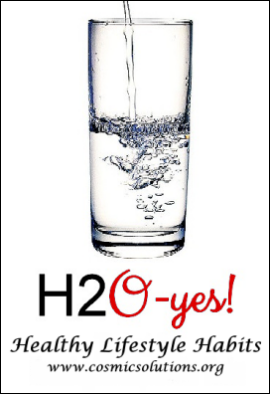
Amino Acids
When consumed protein sources are broken down or digested, amino acids are the end product. The human body uses amino acids to then produce proteins to assist the body with growth, repair, and various other functions. When you next raid the fridge thinking that you need protein for a post-workout meal, it is actually the essential amino acids you require to produce the complete protein source!
Amino acids are classified as:
* Essential amino acids
* Nonessential amino acids
* Conditional amino acids
Essential amino acids
Essential amino acids cannot be produced naturally by the body, therefore they must come from food sources we consume. As essential amino acids do not get stored by the liver to be used later like carbohydrates and fat, it is imperative for normal body functions that these amino acids are consumed daily. The nine essential amino acids are: histidine, isoleucine, leucine, lysine, methionine, phenylalanine, threonine, tryptophan, and valine.
Nonessential amino acids
Nonessential means that our body is capable of naturally producing the amino acid, even if we do not get it from a food source. The nonessential amino acids include: alanine, asparagine, aspartic acid, and glutamic acid.
Conditional amino acids
Conditional amino acids are not usually classed as essential, except in the circumstances of stress or illness. The conditional amino acids include: arginine, cysteine, glutamine, tyrosine, glycine, ornithine, proline, and serine.
You are not required to consume essential and nonessential amino acids at each meal, but obtaining a balance of them over the whole day is important. Rather than trying to find food sources containing each individual essential amino acid, I find it much easier to just consume food sources containing protein on a daily basis!

Omega-3 & Omega-6
The human body is capable of manufacturing all the fatty acids it requires except for two, being linoleic acid (LA, an omega-6 fatty acid), and alpha-linolenic acid (ALA, an omega-3 fatty acid). These LA and ALA fatty acids must be ingested from the diet and are therefore called 'essential fatty acids'. Both of these fatty acids are required for repair and growth, but they can also be utilised in the production of other fatty acids, for example, arachidonic acid (AA) is produced from LA.
As LA and ALA conversion to the omega-3 fatty acids eicosapentaenoic acid (EPA) and docosahexaenoic acid (DHA) is slightly inadequate, it is recommended that sources of these omega-3 fatty acids should also be included to the diet. LA and ALA fatty acids can be sourced from plant oils and seed oils. Usually the levels of LA (omega-6) are much higher than those of ALA (omega-3) within the average diet.
Omega-3 (ALA)
Chia Seeds, Flax Seeds, Canola Oil, Soybeans, Pumpkin Seeds, Walnuts, Brussels Sprouts, Cauliflower, Kale, Spinach, Salad Greens, Tofu.
(EPA & DHA)
Algae, Krill Oil, Salmon, Tuna, Mackerel, Halibut, Sardines, Herring, Shellfish.
Omega-6 (LA)
Chia Seed Oil, Krill Oil, Flax Seed Oil, Grapeseed Oil, Safflower Oil, Sunflower Oil, Corn Oil, Sesame Oil, Wheat Germ Oil, Pumpkin Seed Oil, Soybean Oil, Walnut Oil, Canola Oil, Evening Primrose Oil.
Food sources with the better Omega-6 to Omega-3 ratio are Krill Oil, Fish Oil, Chia Seed Oil, Flax Seed Oil, and Canola Oil.
Krill Oil omega 3 fatty acids are identical to the lipids within the human cell membrane, whereas fish oils are not. Fish Oil needs to be manufactured into phospholipids by the liver. This conversion process is often ineffective and does not always guarantee that the Omega-3 fish oil EPA and DHA end up as a component of the cell membrane.

Carbohydrates
When carbohydrates are consumed, they are broken down by the digestive system into minute units of sugar including fructose, galactose, and glucose. These minute units of sugar are absorbed from the small intestine into the bloodstream and travel to the liver where the fructose and galactose units of sugar are transformed into glucose. This glucose is then transferred via the bloodstream to various body organs and tissues where it will be utilised as energy.
In the circumstances that body glucose levels are already sufficient, the excess glucose will be stored within the liver and skeletal muscles in the form of glycogen. As glycogen storage levels are limited, when glycogen storage is full, the glucose is then stored as body fat. This glycogen storage is used as an instant energy source when the body requires more glucose than is readily available from the bloodstream, such as when engaged in high intensity training or prolonged continuous exercise.
Consuming carbohydrates restricts the use of protein being used as an energy source. When carbohydrate consumption is insufficient, protein will be broken down to produce glucose to supply and maintain a continuous blood glucose level. However, when proteins are broken down to supply the required energy, they lose their primary role as building blocks for muscle growth. Protein break down will also increase stress on the kidneys when protein by products are secreted into the urine.
Once again low carbohydrate diets are becoming popular for weight management or weight loss, but regardless of their claims, research suggests that low carbohydrate diets do not lead to long term weight loss and may even contribute to serious health issues. The basic principle behind recommending the consuming of fewer carbohydrates is the concern that carbohydrates cause weight gain. This marketing approach is rather misleading and may become dangerous to your health because weight gain actually occurs from an excess in overall calories or kilojoules. In other words, consuming excessive food sources containing carbohydrates, fats or protein will cause weight gain.

Dietary Fibre
Soluble or Insoluble:
Soluble fibre dissolves in water to form a gel like substance that assists in lowering blood cholesterol and glucose levels. Soluble fibre can be sourced from oats, barley, seeds, beans, peas, carrots, apples, citrus fruits, and psyllium.
Insoluble fibre encourages the movement of material through the digestive system by increasing stool bulk. Insoluble fibre can be sourced from wheat bran, whole wheat flour, brown rice, nuts, fruits, green beans, cauliflower, and dark leafy vegetables.
Generally plant based foods like oatmeal and beans will contain both soluble and insoluble fibre. To obtain the greatest health benefits, be sure to consume a wide variety of high fibre foods.
High Fibre Benefits:
* Dietary fibre, predominantly insoluble fibre, assists in the prevention of constipation by increasing stool weight and reducing gut transit time. This result is very much improved if fibre intake is paralleled by an increase in water intake.
* The production of short chain fatty acids when fibre is fermented by gut bacteria are an essential source of energy for healthy colon cells and beneficial for inhibiting the growth of gut tumour cells.
* By regulating bowel function, dietary fibre can reduce the risk of acquiring various diseases and disorders such as diverticular disease or haemorrhoids, and may also provide a protective outcome against colon cancer.
* Epidemiological studies recognise another role for dietary fibre in the prevention of coronary heart disease being that of improving blood lipid profiles, and clinical trials substantiate the results of these epidemiological studies. Isolated gelatinous fibres such as oat bran, pectin, or rice bran lower both total serum cholesterol and low density lipoprotein cholesterol levels. Further studies have discovered that diets high in a combination of dietary fibre also provide protection against coronary heart disease.
* Soluble fibre slows digestion and absorption of carbohydrates, therefore lowering the rise in blood glucose and insulin response after a meal. Improving control of the blood glucose levels is beneficial for individuals with diabetes.
Whilst preventing constipation, improving blood glucose levels and blood lipid profiles are truly beneficial outcomes of a high fibre diet, another obvious benefit quite often overlooked is worth mentioning. A diet high in fibre supplies bulk to the diet without added calories, therefore it can provide a satiating effect on appetite and assist in weight management.
Consuming various sources of fibre is the key to gaining maximum benefits. A healthy balanced diet consisting of vegetables, fruits, and whole grains, will not only supply sufficient dietary fibre, but various other nutrients and food elements that are vital for sustaining good health.

